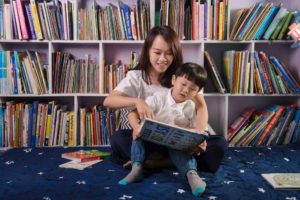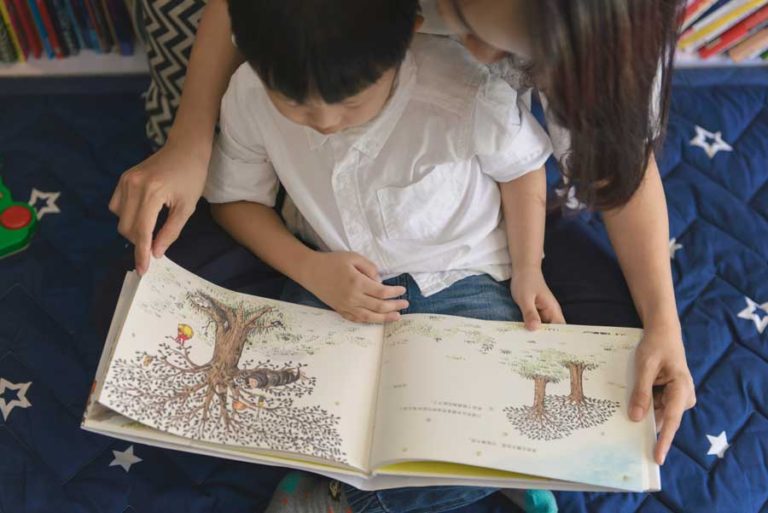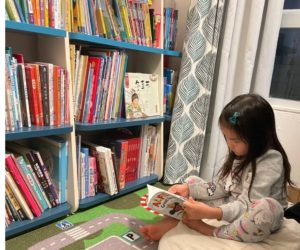感谢您的查阅!抱歉我们暂时没有把这篇文章翻译成中文。如有所需我们会乐意翻译,敬请提供回饋。谢谢您的支持!
Have you ever walked past two people arguing and you tried to eavesdrop what the story is? Certainly the case for my children and even my husband! Some say it’s nosiness (八卦), personally I think it is in our genes that human beings just love stories, be it the true experiences told by our grandparents, stories written by gossip magazines, or movies projected onto the big screens. It is our innate nature to like listening and telling stories, and this starts from birth.
Most parents would probably have read or heard that reading stories to your children is good and this should start from birth, but do you know why? To facilitate better academic results is an answer I often hear parents say, which is not wrong, but do you realise the outcome of reading together is much more profound and life defining when done properly by parents.
Recent guideline released by The American Academy of Paediatrics requests doctors to advise parents to read aloud to their infants from birth during the baby’s check-ups (together with recommendation on breastfeeding and immunising babies.[1]). This shows the importance of reading together since young.
Although a baby may not be able to speak yet, repeated new experience such as reading stimulates multiple senses (e.g. hearing, sight, touch). This forms new neuron connections in the child’s brain, shaping the way the child thinks, feels, behaves and learns in the future, and this brain development is especially rapid during the first five years of life:
Neural Networks

Graphic: Lawson Parker. Sources: Charles Nelson, Harvard Medical School; Pat Levitt, Children’s Hopstial, LA. Synapse drawings based on Golgi Stain Preparations (1939-1967) by J.L.Conel
The primary reasons for reading with your children should not just be teaching them knowledge – in fact these can be picked up any time and at any age when one wants to. The more important things I personally think reading together brings are the intimacy from quality bonding, and with it the cognitive abilities (认知能力) or the “soft skills” – this is the ability to acquire knowledge, and to process and apply the knowledge.
With these, our children will be able to continue acquire knowledge and topics that inspire them on their own even after they leave school, which is constantly evolving anyways with the speed the world changes.
The four key cognitive abilities arising from the quality bonding via reading together can be summarised as follows:
1) Developing better language skills and vocabulary – sure telling your kids your own stories is a good start, but our choice of improvised words are often not as diverse and beautifully worded as books, and the content is likely limited in our practical life ways.
Books empower parents to introduce words we probably wouldn’t have used ourselves (and this can be done without hard work, just read out loud from good books!) This equips our kids with the capabilities to express how they feel and what they think, which is important on any occasion from young till older, assisting them to be better communicators.
2) Planting seeds for good interpersonal skills – children often stop us during a reading session to ask question or make comments – this is a good sign so by all means don’t stop them! This shows that they are engaged in the story or have found something interesting, so take the time to address these golden opportunities.
Reading together is also a time to listen to our children and let them speak and express themselves, it is often through these that we learn more about each other, through giggles and discussions, understanding what ticks and what and how each other thinks. It is the building blocks to having great interpersonal skills in the future. Parents should also feel entitled to read to children in our native language, as this often leads to better engaging conversations through the language we are most fluent with ourselves.
3) Cultivating valuable thinking skills and creativity – books are great conversation starters, and it is through these that parents can share our own values and perspectives with our children. Conversations illustrate how we and different characters think and perceive different things, helping our children learn what is right and what is wrong and how the world works.
Stories also spark imagination and creativity in children, which is often the joy and hook in reading. Creativity also helps problem solving by thinking out of the box, so next time when your child picks up a book that appears silly or out of context to you, let them be.
4) Laying the foundation for self-motivated learning – when kids are regularly exposed to a variety of good story books that interest them, it will naturally motivate them to learn read by themselves. They will start picking up picture books to flick, as these enable them to figure out most of the storyline from just the pictures.
It is this desire and ability to pick up a book to read themselves, the source and the beginning of future motivation and independence to self-learning for the rest of their lives.
“The fire of literacy is created by the emotional sparks between a child, a book, and the person reading. It isn’t achieved by the book alone, nor by the child alone, nor by the adult who’s reading aloud—it’s the relationship winding between all three, bringing them together in easy harmony.”
by Mem Fox, an Australian writer of children’s books and educationalist specialising in literacy

So, start telling your children your own stories, tell them how your day went or funny things that happened, you will start to find your children beginning to tell you their own daily stories too. Of course, one could delve into the technicalities of how to tell a good story, such setting the mood and what tone to use, but to children, it is if you have the ‘heart’ to tell them stories that matters.
Setting aside time to read with your children every day as part of your routine will ensure you get some quality bonding time with your children, no matter how hectic or busy your day went. Don’t hesitate. Start telling your kids endless story. Start with your own’s, and certainly continue to tell more with good books!
[1] Policy Statement by American Academy of Paediatrics – “Literacy Promotion: An Essential Component of Primary Care Pediatric Practice” – PEDIATRICS Volume 134, Number 2, August 2014





